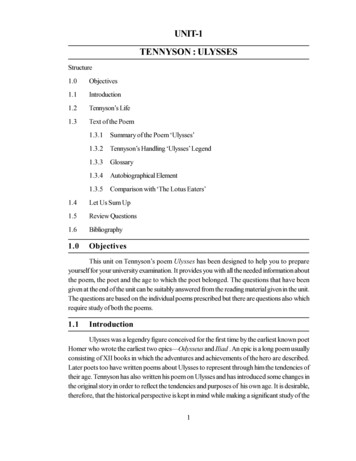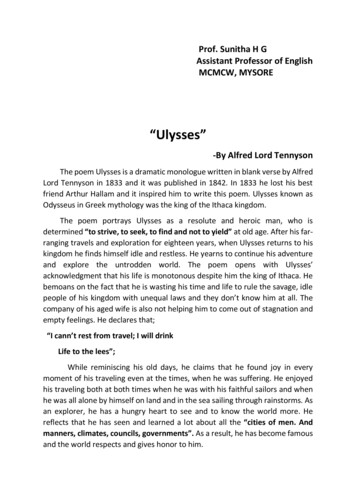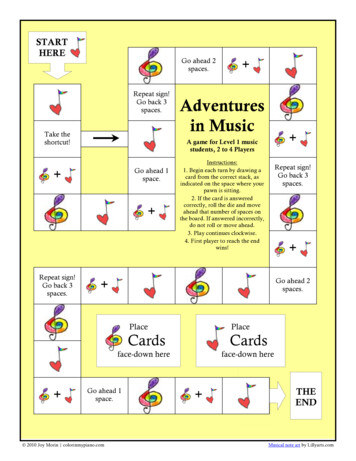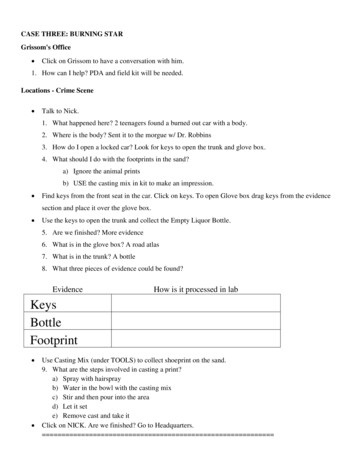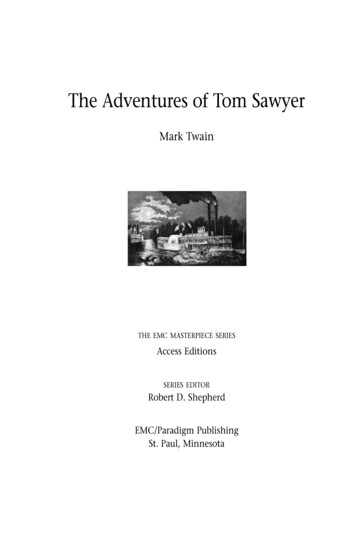
Transcription
-
Y
THEADVENTURES OF ULYSSES
Map of the Wanderings of Ulysses.
THEADVENTURES OF ULYSSESBYCHARLES LAMBWITH A PREFACE BY ANDREW LANGILLUSTRATED WITH THIRTY-FOUR DESIGNS BY FREDERICK PRELLER“It certainly seems a pity that incidents, characters and images, that are part of thecurrent coin of the world’s intercourse, should not become familiar in the years when imagina tion is keenest and freshest.”—Canon Aingek.PHILADELPHIAGEBBIE & CO., Publishers1890
Copyrighted, 1890,Gebbie& Co.
llPREFACE BY ANDREW LANG.The book which you are going to read is One of thebest stories in the world, and the oldest.Perhaps the best way to understand all about the taleis first to look at a map of Greece.You see the countryis almost divided into two parts by two gulfs of the sea,the Gulf of Corinth on the west, the Gulf of dEgina onthe east.Now just north of the opening of the Gulf ofCorinth you see a big island, Cephalonia, and a littleone called Ithaca.Well, it was in this little island,Ithaca, that Ulysses lived, the man whose adventuresand voyages you are going to read.Long, long ago ;When did he live?perhaps fourteen hundred years ormore before the birth of Christ.That would make itabout three thousand two hundred years ago.In thosetimes Greece was not one country and kingdom as it isto-day, but there was a separate king, or prince, foralmost every town.Some had more lands and subjects,some less, but of them all Ulysses owned nearly the(3)
4PREFACE BY ANDREW LANG.smallest kingdom and the fewest subjects.In everylittle state the king was the leader in war, and the chiefjudge, but he had men to help him by their advice, andhe was chief in a little parliament or council.These old Greeks only knew Greece, and the islandsnear it, and the coast of Asia Minor, and Egypt, andperhaps Sicily.Took what a tiny part of the worldthat is on the map !wasasunknownAll the rest of the Mediterraneanas the Atlanticcrossed it and found America.before ColumbusSo they fancied that inthe seas they had never sailed wereislands full ofgiauts, witches, and cannibals, such as Ulysses met inthe story.All round the whole world, they thought,ran a great river, which they called Oceanus, or ocean.Beyond that river the souls or ghosts of dead peoplelived, in a gray, dim light, like a foggy day.But how do we come to hear about Ulysses at all ?There was no printing in his time.Perhaps the Greekscould not even write then ; at all events they wrote verylittle.The person who gave us the story of Ulyssesmust have heard it told by word of mouth, just as youmay hear one child tell another a fairy-tale.Part of itwas remembered, perhaps, and a great deal more musthave been invented, once upon a time, very long ago,just as a man invents a novel.But it could not bewritten down, of course, while there was no writing.It was just told for pleasure, and the son heard it fromhis father, and told it again to his child, when he had achild of his own.
PREFACE BY ANDREW FANG.5So it went on, till about a thousand years or ninehundred before the birth of Christ.It would be aboutthe very time when David, in the Bible, was king ofIsrael, or Solomon was building his temple.Then apoet was born somewhere in Greece, and he heard thestory told, and he made it into a poem.Well, the poet made all the long poem about Ulysses.Some people think he merely made it up in his head,and remembered it off by heart, and repeated it in publicfor his daily bread.But I think, myself, that the Greekscould write by his time, and that he made a book of itto remember it by.It would not be a printed book likethis, but perhaps it was written on the leaves of a plantcalled papyrus, from which our word “paper” is de rived.Or perhaps it was scratched with a sharp pointon very thin plates of lead.Any way, I believe hewrote it, for it makes four hundred pages of Englishprinting, and I defy him to have remembered all thatas he made it up.The poet’s name wasHomer.He was the first poetwe know of, and the best, along with Shakespeare.Nobody knows where he was born, whether in Greeceitself or on the opposite shore of Asia Minor.He made more poems than one.The first is calledthe Iliad, because it is about the siege of Ilios, or Troy,as we generally call it.whenUlysses fought in that war, and,the Iliad was finished,people asked,became of the brave Ulysses afterwards?”“WhatSo Homermade a new poem to tell them all about that, and this
6PREFACE BY ANDREW LANG.is the poem which gives the story you are going to read.They called it the Odyssey, or poem about Odysseus, forOdysseus was the old way of saying Ulysses.At this time the king of a town on the east side ofGreece had a very beautiful daughter.Helen,Her name wasand she was by far the loveliest woman whoever lived in the world.Now, all the young princes—and Odysseus like the rest—wanted to marry her, andcame offering whole flocks and herds for her.But herfather made them all promise that, whoever marriedher, all the rest would help him in case he was in anytrouble.So they swore to it, and then her father gaveher, not to Ulysses, but to Menelaus, the king of Sparta.So the rest went home, and married wives less pretty thanHelen ; but Ulysses married Penelope.When his little,son, Telemachus, was a baby, bad news came to Ithaca.The son of a king named Priam, on the other side ofthe sea, had sailed from Troy, in Asia Minor, and hadgone to Sparta, where Helen lived with her husband.There he had fallen in love with her, as, indeed, every body did who saw her ; for she was as kind and charm ing as she was beautiful.Now this young prince,named Paris, wanted to get her to leave her husband,and run away with him.Then he asked her to comefor a sail with him, and she went, of course. , Whenonce he had her on board his ship, off he sailed with herto Troy, all across the sea.So there was no help for it,Helen could not get back, and would have been ashamedto go.
PREFACE BY ANDREW LANG.7Well, when it was told that Menelaus had been robbedof his wife, all the princes remembered how they hadsworn to help him if ever he needed help.And theygathered a great army under Agamemnon, the brotherof Menelaus.He was the general.And Ulysses lefthis wife and his little boy in Ithaca, and gathered hisfighting men, and sailed away with the rest.Theysailed across the sea to Troy, in Asia Minor, whereHelen was living.And they fought there for ten longyears, till they took the town.Homer tells that part ofthe tale in his Iliad, which is all about fighting.Whenthey had taken Troy Helen was given back to Menelaus,and the Greeks began to go home.But many greatstorms arose, and the ships were scattered over all theseas, and some were drowned, and others wandered long.But Ulysses was wandering for ten whole years beforehe reached Ithaca.Now the story tells of all the won derful things that happened to him in his wanderings—how he met giants and goddesses, and monsters of thedeep, and cannibals that eat men’s flesh, and how hesaw the ghosts of the dead.How he was shipwrecked,and all his men were killed or drowned.How his souwent to look for him, and met fair Helen happy at homewith her own husband, and how she gave him a presentfor his bride when he married.How Ulysses camehome at last, and found young men living in his wife’shouse at his expense, and wanting to marry her, andtake the kingdom.How he killed them all, every one,gnd how his wife and he were so happy after being
8PREFACE BY ANDREW LANG.separated from each other for twenty years.And thoughshe was not young any more, nor so pretty as she hadbeen, he only cared for her, and longed only for herand his own little rocky island.Yet a goddess hadoffered to make him immortal—that is, never to die—and always live with her in a beautiful place.preferred his own home and his wife.But heThe poem inwhich this tale is told has been read now by all theworld for about three thousand years.The story hereis made out of the poem, for children, by Charles Lamb,who wrote many other delightful books.But, in themeantime, forgive me for having kept you so long fromThe Adventures of Ulysses.Andrew Lang.
ContentsPAGEPreface, by Andrew Lang.3Introduction, by Charles Lamb.13CHAPTER I.The Cicons—The fruit of the lotus-tree—Polyphemus and theCyclops—The kingdom of the winds, and God Ajolus’ fatalpresent—The Lsestrygonian man-eaters.15CHAPTER II.The house of Circe—Men changed into beasts—The voyage to hell—The banquet of the dead.37CHAPTER III.The song of the Sirens—Scylla and Charybdis—The oxen of theSun—The judgment—The crew killed by lightning.60.77CHAPTER IV.The island of Calypso—Immortality refused.CHAPTER V.The tempest—The sea-bird’s gift—The escape by swimming—Thesleep in the woods. .-85CHAPTER VI.%The princess Nausicaa—The washing—The game with the ball—The Court of Phaeacia and king Alciuous.-95(9)
JOCONTENTS.CHAPTER VII.PAGEThe songs of Demodocus—The convoy home—The mariners trans formed to stone—The young shepherd.106CHAPTER VIII.The change from a king to a beggar—Eumaeus and the herdsmen—Telemachus. 122CHAPTER IX.The queen’s suitors—The battle of the beggars—The armor takendown—The meeting with Penelope.140CHAPTER X.The madness from above —The bow of Ulysses—The slaughter—The conclusion. 152Index op Proper Names.165
1f *IL LUSTRATIONS.PAGEMap of Ulysses’ Wanderings.Ulysses Going Forth on his Travels.Frontispiece.13Tailpiece.14Polyphemus and the Followers of Ulysses.15Conquest of Ismarus, Capital of the Cicons.17Escaping from Polyphemus.29Tailpiece.34Circe.35The Warning of Mercury to Circe.37Mercury Instructing Ulysses how to Resist Circe.41Ulysses in Hades.51Tailpiece.Circe Warns Ulysses of the Sirens59.60The Sirens.65The Followers of Ulysses Slay the Oxen of Apollo.73.Tailpiece.76On the Island of Calypso.77Calypso.81Tailpiece.84(11)
12ILLUSTRATIONS.PAGEUlysses Departs from Calypso and Embarks for Ithaca85Leucothea Rescues Ulysses.89Tailpiece.94The Princess Nausicaa and Ulysses.95The Princess Nausicaa and Ulysses.99Tailpiece.105The Song of Demodoc'us.106Ulysses Awakens in Ithaca.115Ulysses and the Goddess Minerva.119Tailpiece.121The Transformation of Ulysses by Minerva. 122Tailpiece.139The Suitors of Penelope.140Tailpiece.151Ulysses Slays the Suitors of Penelope.152Tailpiece.163
Ulysses Going Forth on his Travels.INTRODUCTION.ThisUlysses.work treats of the conduct and sufferings ofThe picture which it exhibits is that of abrave man struggling with adversity ; by a wise use ofevents, and with an inimitable presence of mind underdifficulties, forcing out a way for himself through theseverest trials to which human life can be exposed ;withenemies natural and preternatural surroundinghim on all sides.and women,The agents in this tale, besides menare giants,enchanters,sirens :thingswhich denote external force or internal temptations, thetwofold danger which a wise fortitude must expect toencounter in its course through this world.The fic tions contained in it will be found to comprehend someof the most admired inventions of Grecian mythology.The groundwork of the story is the Odyssey, but themoral and the coloring are comparatively modern.Byavoiding the prolixity which marks the speeches andthe descriptions in Hcnner, I have gained a rapidity to2(13)
14INTRODUCTION.the narration which I hope will make it more attractiveand give it more the air of a romance to young readers,though I am sensible that by the curtailment I havesacrificed in many places the manners to the passion,the subordinate characteristics to the essential interestof the story.The attempt is not to be considered asseeking a comparison with any of the direct translations,of the Odyssey, either in prose or verse, though if Iwere to state the obligations which I have had to oneobsolete version,1 I should have run the hazard of de priving myself of the very slender degree of reputationwhich I could hope to acquire from a trifle like thepresent undertaking.CHARLES LAMB.1 The translation ofHomer by Chapman in the reign of James I.o
Polyphemus and the Followers of Ulysses.THE ADVENTURES OF ULYSSES.CHAPTER I.The Cicons—The fruit of the lotos-tree—Polyphemus and the Cyclops-—The kingdom of the winds, and God epolus’ fatal present—TheUaestrygonian man-eaters.Thishistory tells of the wanderings of Ulysses andhis followers in their return from Troy, after the de struction of that famous city of Asia by the Grecians.He was inflamed with a desire of seeing again, after aten years’ absence, his wife and native country Ithaca.He was king of a barren spot, and a poor country, incomparison of the fruitful plains of Asia which he wasleaving, or the wealthy kingdoms which he touchedupon in his return ; yet wherever he came he couldnever see a soil which appeared in his eyes half so sweetor desirable as his country earth.This made him re fuse the offers of the goddess Calypso to stay with her,and partake of her immortality, in the delightful island :(151
16the; adventures of ulysses.and this gave him strength to break from the enchant ments of Circe, the daughter of the Sun.From Troy ill winds cast Ulysses and his fleet uponthe coast of the Cicons, a people hostile to the Grecians.Landing his forces, he laid siege to their chief city Ismarus, which he took, and with it much spoil, and slewmany people.But success proved fatal to him ; for hissoldiers, elated with the spoil and the good store of pro visions which they found in that place, fell to eatingand drinking, forgetful of their safety, till the Cicons,who inhabited the coast, had time to assemble theirfriends and allies from the interior, who, mustering inprodigious force, set upon the Grecians, while they neg ligently revelled and feasted, and slew many of themand recovered the spoil.They, dispirited and thinnedin their numbers, with difficulty made their retreat goodto the ships.Thence they set sail, sad at heart, yet somethingcheered
Well, the poet made all the long poem about Ulysses. Some people think he merely made it up in his head, and remembered it off by heart, and repeated it in public for his daily bread. But I think, myself, that the Greeks could write by his time, and that he made a book of it to remember it by. It would not be a printed book like this, but perhaps it was written on the leaves of a plant called .

